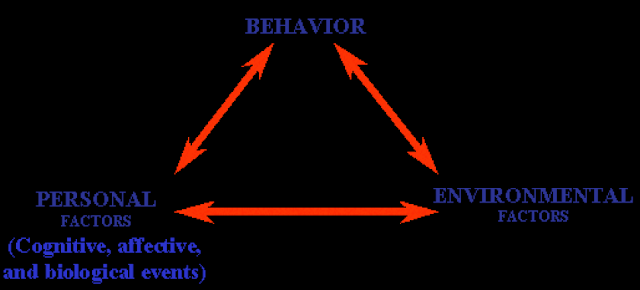What is Cognition? Explain Different Theories of Cognition.
If you want to view other related topics. Click Here.
Social Cognitive Theory
- Behavioural factors
- Evironmental factors (extrinsic)
- Personal factors (intrinsic)
These 3 variables in Social Cognitive Theory are said to be interrelated with each other, causing learning to occur. An individual’s personal experience can converge with the behavioural determinants and the environmental factors.

In the person-environment interaction, human beliefs, ideas and cognitive competencies are modified by external factors such as a supportive parent, stressful environment or a hot climate. In the person-behavior interaction, the cognitive processes of a person affect his behavior; likewise, performance of such behavior can modify the way he thinks. Lastly, the environment-behavior interaction, external factors can alter the way you display the behavior. Also, your behavior can affect and modify your environment. This model clearly implies that for effective and positive learning to occur an individual should have positive personal characteristics, exhibit appropriate behavior and stay in a supportive environment.
In addition, Social Cognitive Theory states that new experiences are to be evaluated by the learner by means of analyzing his past experiences with the same determinants. Learning, therefore, is a result of a thorough evaluation of the present experience versus the past.
1. Observational Learning
2. Reproduction
3. Self-efficacy
4. Emotional coping
5. Self-regulatory capability
B. Cognitive Behavioural Theory
Cognitive Behavioural Theory describes the role of cognition (knowing) to determining and predicting the behavioural pattern of an individual. This theory was developed by Aaron Beck.
The Cognitive Behavioural Theory says that individuals tend to form self-concepts that affect the behavior they display. These concepts can be positive or negative and can be affected by a person’s environment.
- The self (i.e., I am rubbish)
- The world/environment (i.e., the world is irrational)
- The future (i.e., my future is doomed)
Concrete operational
The main goal at this stage is for a child to start working things out inside their head. This is called operational thought, and it allows kids to solve problems without physically encountering things in the real world.
Formal operational
Piaget believed that people of all ages developed intellectually. But he also believed that once a person reaches the formal operational stage, it’s more about building upon knowledge, not changing how it’s acquired or understood.

